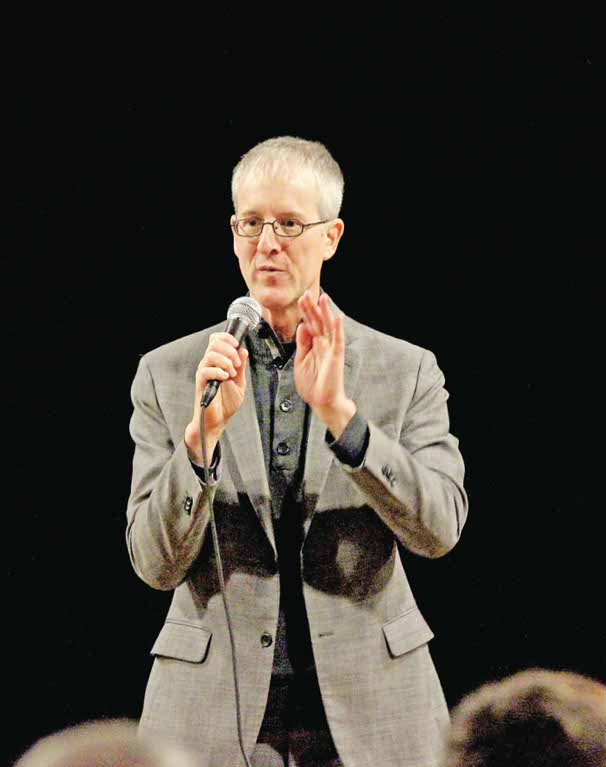Improving Tuscaloosa’s walkability can have significant impact on the city’s economy, its footprint and the health of its residents, according to Jeff Speck, a city planner and architectural designer.
Speck, who has been featured on NPR, given a TED talk and has been involved in the planning of numerous city centers and communities including Rosemary Beach, spoke to a large crowd of University of Alabama students and Tuscaloosa residents at the Dinah Washington Cultural Arts Center on Monday night about the benefits of planning a city considering walking as transportation versus driving.
“The key to having a walkable city is where driving is seen as a freedom rather than a necessity,” Speck said. “It’s a question of, ‘If your car didn’t work, could you survive?’”
Speck’s lecture was part of a community event sponsored by the Honors College and the Center for Ethics and Social Responsibility and was organized in part by PlanFirst, a UA Honors College class dealing with city planning for non-majors.
In his 45 minute lecture about the current state of American cities and how they compare to cities around the world Jeff also talked about the current climate of thought surrounding city development and urban living.
Speck said there is a growing trend among the younger generations who desire to live in a walkable, urban environment. He said one in four 19-year-olds are now opting out of getting their driver’s license and 77 percent are interested in living in urban areas.
Speck said that said the trend among Millennials may be due to the culture the generation has been raised in with urban shows like “Seinfeld” or “How I Met Your Mother” rather than the suburban set shows like “The Brady Bunch.” Millennials are not the only ones interested in walkable urban areas, however. Speck said older people often want to live in a place where they can remain active even when they can no longer drive.
“At some point, people have to stop driving,” Speck said. “Older people want to live in a place where they can remain involved.”
The lecture also touched on the health benefits of having a walking-friendly city landscape. Speck said recent research has linked health issues such as obesity with periods of inactivity such as a long commute to work. Cities with good walkability and extensive bike facilities have been shown to have a healthier citizenry.
After the lecture, the floor was opened for questions where Speck was quickly asked about his opinions on Tuscaloosa.
“The downtown area is pretty good, but there are definitely areas that need improvement,” he said.
Speck said to get people to want to walk around, the walk must be more attractive than the drive.
“Walking has to be seen as useful, safe, comfortable and interesting,” Speck said.
While certain streets incorporate these aspects, Speck said there is a lack of consistency in Tuscaloosa, especially with regards to the appeal and comfort of walking in downtown.
Speck also suggested that instituting bike lanes would cater to a college population that has a high interest in bike riding.
After answering questions, Speck signed copies of his new book, “Walkable City: How Downtown Can Save America One Step at a Time.”
As a continuation of the event, Speck will lead a workshop Tuesday at 9:30 a.m. also at the Dinah Washington Cultural Arts Center downtown. The workshop will apply Speck’s work and the ideas of walkability specifically to Tuscaloosa.









